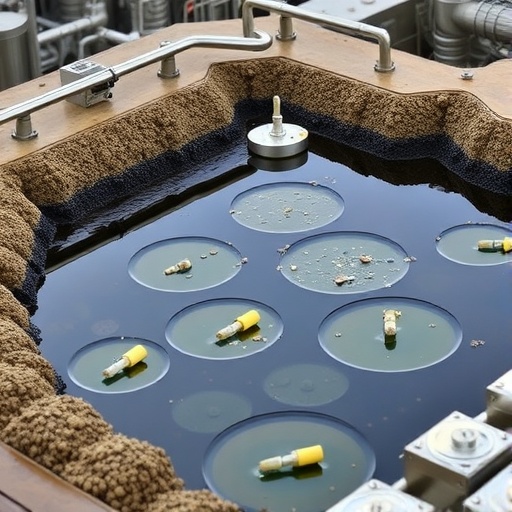In a groundbreaking study recently published in Waste Biomass Valor, researchers have unveiled a novel approach to enhance the efficiency of microbial fuel cells (MFCs) by augmenting the population of Escherichia coli (E. coli) in anaerobic sludge. This research stands at a significant crossroads in bioenergy generation and waste management, addressing the pressing need for sustainable energy sources and efficient waste treatment processes. With the world’s energy demands continuously on the rise, the push towards renewable energy sources has never been more urgent.
Microbial fuel cells represent a transformative technology that utilizes microbial metabolism to convert organic substrates directly into electrical energy. This process not only offers a potential solution for energy generation but also facilitates the simultaneous treatment of waste. However, one of the limiting factors in the performance of MFCs has been the specific activity and efficiency of the microorganisms involved, particularly in regard to their ability to effectively oxidize organic matter and transfer electrons to an anode.
The team, spearheaded by Rajesh P.P. and accompanied by Devika H. and Christine P., sought to address these challenges by focusing on the anaerobic enzymatic activity of E. coli. Typically known for its prevalence in gut flora and as a common laboratory strain, E. coli has shown remarkable versatility and adaptability in various environmental conditions, making it an ideal candidate for biotechnological applications. By isolating and enriching E. coli populations in anaerobic sludge, the researchers aimed to increase the bacterial count and, consequently, the overall performance of the microbial fuel cells.
The methodology employed in this study was rigorous and detailed, involving selective enrichment techniques that promoted the growth of E. coli while suppressing the growth of non-target microorganisms. This selective culturing process allowed for a significant increase in the E. coli population, which was then integrated into the MFCs to assess the effect on electricity generation. The experimentation phase yielded intriguing results, showcasing a marked improvement in power output and substrate degradation efficiency.
One of the most striking outcomes of the study was the enhanced electrochemical performance associated with the augmented E. coli counts. The research team measured key parameters, including current density and voltage output, both of which showed dramatic improvements compared to control setups with lower E. coli concentrations. These results highlight the critical role that microbial population density plays in the overall efficacy of MFC technology.
In addition to power generation, the research emphasized the metabolic capabilities of the enriched E. coli. The bacterium’s ability to utilize various substrates, including organic wastes from agricultural and industrial processes, established a win-win scenario for both energy generation and waste reduction. This dual benefit positions microbial fuel cells as not just power sources, but also as effective waste treatment systems, aligning with global sustainability goals.
The implications of these findings extend beyond laboratory experiments to real-world applications. The prospect of integrating MFC technology with existing waste treatment facilities could lead to more sustainable operations, significantly reducing the environmental impact of waste management practices. Moreover, the findings could inspire further research into optimizing other bacterial strains for even greater enhancements in microbial fuel cell performance.
As the global scientific community becomes increasingly aware of climate change and environmental degradation, research such as this underscores the potential for innovative biological solutions in addressing these challenges. The emphasis on microbial processes opens the door to novel energy and waste management strategies that could be pivotal in the transition towards a bio-based circular economy.
In conclusion, the research detailed in this study serves as a powerful testament to the potential for microbial enhancement in energy generation systems. By focusing on E. coli within anaerobic sludge, Rajesh and colleagues have not only shed light on a promising pathway for improving microbial fuel cell efficiency but have also set the stage for future explorations into microbial biotechnology. The dual benefits of enhanced energy production and effective waste treatment present an exciting opportunity for further investigation and development in this dynamic field.
This study is a reminder of the importance of interdisciplinary approaches in tackling some of the most pressing challenges of our time. With the successful augmentation of E. coli counts in anaerobic sludge, the path towards more efficient microbial fuel cells appears not only feasible but essential for a sustainable future.
As we digest the implications of this research, it becomes clear that the synergy between waste management and renewable energy generation could play a crucial role in crafting a more sustainable future. This study is a beacon of hope, showcasing the innovative spirit of scientists and the potential for revolutionary advancements in addressing global energy and environmental challenges.
With the findings stirring enthusiasm in the scientific community, the discourse around microbial fuel cells is likely to gain momentum, paving the way for robust discussions and collaborations aimed at refining and deploying this technology for large-scale applications.
In the years to come, we can anticipate further refinement of microbial fuel cell technologies, driven by such inspiring research endeavors. As the dynamics of our energy landscape continue to evolve, breakthroughs like these are essential in ensuring that we harness the potential of nature and science working harmoniously together.
Subject of Research: Enhancement of microbial fuel cell efficiency through Escherichia coli enrichment in anaerobic sludge.
Article Title: Augmenting Escherichia coli Count in Anaerobic Sludge by Isolation and Enrichment for Enhancing the Performance of Microbial Fuel Cell.
Article References:
Rajesh, P.P., Devika, H., Christine, P. et al. Augmenting Escherichia coli Count in Anaerobic Sludge by Isolation and Enrichment for Enhancing the Performance of Microbial Fuel Cell.
Waste Biomass Valor (2025). https://doi.org/10.1007/s12649-025-03301-4
Image Credits: AI Generated
DOI:
Keywords: Microbial fuel cells, Escherichia coli, anaerobic sludge, energy generation, waste treatment, bioenergy.




